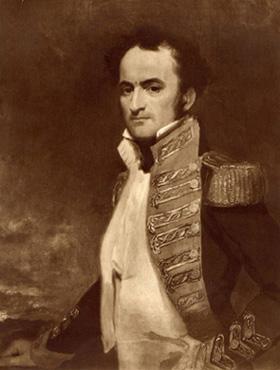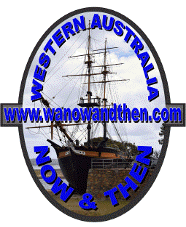|
|
|||
|
|
|
|
|
|
|
|||
JAMES STIRLING1791 - 1865
|
|
|
|
|
James Stirling was the 5th son of Scottish parents Andrew and Ann Stirling who had 15 children in all. He joined the Royal Navy serving aboard the HMS Camel aged just 12 (one
source says 13) as a no bounty volunteer - I.e.. he was unpaid. Shortly before his 14th birthday he became a midshipman and finally got paid for his work.
|
|
James' first encounter with colonialism was during a time he provided an escort for ships bound for a settlement in Hudson Bay (Canada). When he finished serving in the Americas his
Commander in Chief sent the following recommendation to the Admiralty in London:
Stirling was only officially proclaimed Governor and Commander in Chief in March 1831. Perhaps the British authorities were waiting to see if the venture would fail before giving him an official title.
For the first two years of service he was entirely dependant on his own means as he received no salary from London.
|
|
|
As the main supporter and first Governor of the Swan River Colony, James Stirling was granted large tracts of land in appreciation of his efforts (and also in lieu of payment for his services).
By October 1837, Stirling had had enough and resigned to return home to England. His wife (Ellen) had borne him no less than seven children (no TV back then) in the time they had
been in W.A. and despite his large land holdings Stirling was never to return to the place he helped get started.
|
|
|
He never lost interest in the small colony he had been responsible for founding and whenever he could he would lend his name and support to those at Swan River who needed it.
Chronology
1791 - Born. 1803 - Joined HMS Camel as a 'no bounty' volunteer. 1805 - Joined HMS Glory. 1809 - Promoted lieutenant aboard the Warspite. 1811 - Became flag lieutenant. 1812 - Given command of HMS Moselle on February 27th. 1818 - Put on half pay and became inactive from the navy. 1823 - Married Ellen Mangles at Stoke Church, Guildford on 3 September. 1825 - Recalled to active service aboard the HMS Success. 1827 - Visits the Swan River. 1828 - Stirling receives his instructions from Downing Street about colonisation. December 30th. 1829 - Stirling and the first settlers arrive off the west coast on May 31st. 1831 - After initially being appointed lieutenant-governor, Stirling is finally appointed Governor in November. 1832 - Extended visit to England to drum up support for the colony. 1834 - Returned to Western Australia. 1838 - Resigns in October 1837 and returns to England the following year. 1840 - Served aboard the Indus on the Mediterranean Station in October. 1844 - Once again returned to shore station. 1847 - Given command of HMS Howe in April. 1850 - Knighted by the King of Greece. 1851 - Promoted to rear admiral in July. 1854-6 - Commander-in-chief of the naval forces in China and the East Indies. 1857 - Promoted to vice-admiral in August. The same year his youngest son, Walter, was killed at Cawnpore in the Indian mutiny. 1862 - Promoted to admiral in November. 1865 - Died 22nd April.
Technically Ellen Mangles was 15 years old when she and James married as the ceremony was 1 day before her 16th birthday.
Links to more information:
Stirling, Sir James (1791-1865) James Stirling (Royal Navy officer) Sir James Stirling -Western Australias first Governor
|
|
|
Become a supporter of this website for just $5 a month
|




